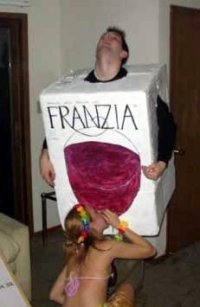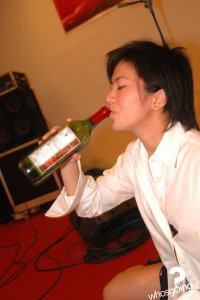Not long ago, Stephen Bachmann, a private-equity investor turned online wine store owner, posted a chart on his widely read blog about wine collecting. The dots on the graphic charted an investment starting at about $1,000 in 2003. They continued on a sustained northerly path — up 100 percent, up 200 percent — peaking above $4,000 in 2007.
If the average investor's E-Trade account looked like that chart, that person would be popping open bottles of champagne. But the chart's subject did not concern the latest hot tech stock. It certainly was not charting the performance of a 401(k) retirement fund. The liquid asset in question was literally liquid: a single bottle of 1990 Petrus, a Bordeaux blend.
"If you didn't know what that was, most people would look at that chart and say that looks like a pretty good investment," said Bachmann, the founder of Vinfolio, based in San Francisco.
Wine is so hot, with demand growing from new wealth centers and palates in China and Russia, that the prices of even some second-tier wines are rising at rates that make the Dow Jones industrial average look as if it's measuring the performance of low-risk municipal bonds. The jump in prices is causing collectors to liquidate parts of their cellars. There are wine investment funds, and there is even an electronic trading exchange in London for fine wine. It's up 39 percent this year, trailing gains in oil by only seven points.
For many, all this sounds too much like the legendary — and popped — tech bubble that cost investors millions of dollars earlier this decade. For others, who don't see demand ebbing any time soon, wine has become a surprising, though highly risky, way to produce returns from an urbane hobby.
"When one sees an opportunity, one would be a fool to let it go," said California attorney Dan Bailey, who has emptied his cellar of his Bordeauxs. He sounds almost surprised at what he's doing: "I guess I invest, yes."
And it hasn't been exactly difficult. Last month, Bailey spotted 10 bottles of rare Burgundy at a local wine store. He liked the price: about $3,500 for them all. The thought of drinking the wine never even crossed his mind. He said he sold them for $10,000 two weeks later. "The demand is just flat-out crazy," Bailey said.
Demand growing
How this all happened is primarily a story of supply and demand. Good wine is extremely limited: It's not as if most vintners can increase their output, and sometimes years can go by between super quality vintages.
But the wine boom is also a lesson in how the Internet creates fluidity in a fractured market, connecting buyers, as Bailey put it, "way out there in the world on the demand curve."
Wine can now be bought and sold over the Internet, particularly at auction through well-known wine stores such as Acker Merrall & Condit in New York or through WineBid.com, one of several popular wine auction Web sites. With demand so strong, even owners of below-first-tier wines can fetch big premiums.
Jerome Zech, chief executive of WineBid.com, remembers buying a bottle of 1990 Pichon Lalande for $29.95 in 1994. Now that wine is selling on his Web site for $140. That's a 367 percent increase in value.
"Things are really different in the wine business than 10 years ago, when most of the auctions were closed, and they were in New York or London," Zech said. "The Internet has allowed people to see pricing globally and to access wines they wouldn't have been able to. A closed, clubby environment has really opened up."
But that doesn't mean that investors should dive right in. The risks and challenges of wine investment are many.
For starters, much of the value of wine is determined by the opinions of a handful of influential critics like Robert Parker. Bachmann, on his blog, wrote: "Should a major wine critic later downgrade his rating of a wine you own, you'll see the value of your wine fall. Conversely, upgrades raise the value. The only problem is that this volatility is completely out of your control."
Because wine investing is not regulated, novices can easily become victims of fraud. And the start-up costs are high because of the difficulty of properly storing fine wine.
Worth more to sell?
Paul Hart, president of Hart Davis Hart, a Chicago wine auctioneer, said the typical investor narrative he sees — and thinks is appropriate — is that of wine connoisseurs who nurture a collection over time, then sell some of their wine either to make room for a new interest or cash out of something when it becomes worth more to sell than to drink.
"A case of wine is 38 pounds, and it takes a lot of space to store, and when you have 700 bottles, it becomes a matter of 'I can never drink all these bottles,'–" Hart said. "Most people don't come into this as an investment. But I'd say for anyone who has been in it for five years or longer, it comes up."
Bachmann, the Vinfolio founder, has provided a number of tips to potential wine investors on his blog.
His first bit of advice is somewhat obvious: Buy investment-grade wine.
"To be a candidate, the wine should have been rated well by recognized critics, preferably 95+ points by someone like Robert Parker, Stephen Tanzer or Allen Meadows," he wrote. "It also helps if the producer's wines have a proven track record for improving in the cellar."
Another bit of advice is to pay close attention to supply and demand factors: "If a wine is close to its peak drinking window, it's time to sell as it won't get any better and demand is likely to fall."
Perhaps his most prescient advice is, "Buy wine you'd be glad to drink so you can convert your losses into gains!"
By Michael S. Rosenwald
Washington Post
Thursday, March 6, 2008
If Wine Is A Staple, Why Do They Rape Us At Restaurants?
If wine is a staple, why do they rape us at restaurants? Dining out in the US really pisses me off when they give it to you without vaseline with the wine prices. Having been accustomed to wine being a staple in Europe, South America, etc; where you might pay a little more for wine at a restaurant and hearing that it is a staple here, is a little hard to bear. Wine is treated like a luxury in the US, hopefully people will make that change or just accept "getting it without vaseline" just like when they buy gasoline.
Pissed Off Wine Drinker
Pissed Off Wine Drinker
Wine Is A Staple, Like Food
''Wine's a staple, like food,'' he says. ``People might put off building that larger kitchen, but they won't stop buying food and beverages.''
Trone
Trone
Subscribe to:
Comments (Atom)



